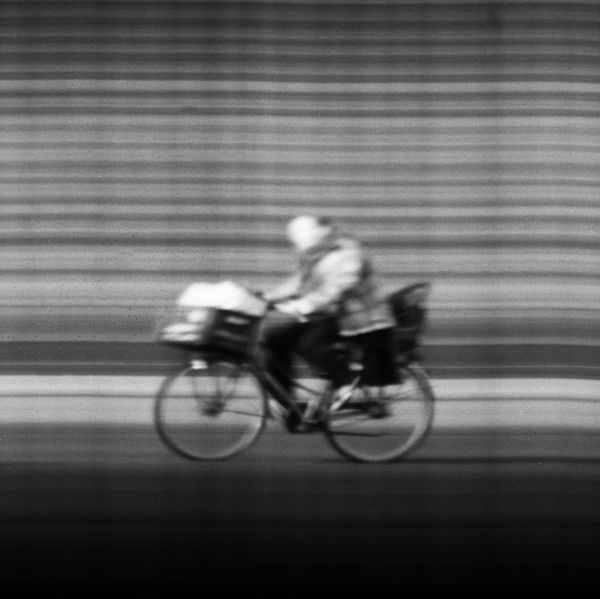Focal Camera Workshop: Difference between revisions
(Blanked the page) |
|||
| Line 1: | Line 1: | ||
For the Focal Camera workshop I made a slit scan camera. | |||
An ongoing area of interest is how many moments and many perspectives can be combined into a single image. I was interested in seeing how to achieve this type of composite image through analogue means. (A side area of interest is how this technique is an early form a 3d scanning. When combined with a turntable, archaeologists would use this technique to unwrap imagery on the surface ceramic vases etc.) | |||
To achieve the slit scan effect two modifications had to be made to the standard focal camera design. The first was creating a mask on the film back. I created two identical black slit masks (approx 2mm wide) on the laser cutter with black cardstock. I sandwiched some thin copper foil in between the two masks to prevent light from passing through. | |||
The second modification was to create a motorised attachment for the film advance dial. I used a geared DC motor connected to an Arduino with a motor controller shield. Attached to the motor was a laser cut hub that would slide onto the film advance dial, the motor controller would then turn the film advance dial at a specified feed rate. Through a simple serial protocol I could start and stop the motor as well being able to control the speed. | |||
I took my photo in the square in front of the Markthal. I fixed the camera between my legs to stabilise and I let the motor run for the entire length the film roll. The appearance of people on the film would differ depending of the speed on in which they passed by. Cyclists appeared at almost a normal scale, people on scooters appear squished, while people on skateboards appeared stretched. | |||
[[File:SLIT1.jpg|600px]] | |||
[[File:SLIT2.jpg|600px]] | |||
<gallery> | |||
mjp_slit_scan_assembled.JPG|The final assembled camera | |||
mjp_slit_scan_motor.JPG|The motor and motor controller | |||
mjp_slit_scan_parts.JPG| Painting the parts | |||
</gallery> | |||
Revision as of 10:25, 11 December 2017
For the Focal Camera workshop I made a slit scan camera.
An ongoing area of interest is how many moments and many perspectives can be combined into a single image. I was interested in seeing how to achieve this type of composite image through analogue means. (A side area of interest is how this technique is an early form a 3d scanning. When combined with a turntable, archaeologists would use this technique to unwrap imagery on the surface ceramic vases etc.)
To achieve the slit scan effect two modifications had to be made to the standard focal camera design. The first was creating a mask on the film back. I created two identical black slit masks (approx 2mm wide) on the laser cutter with black cardstock. I sandwiched some thin copper foil in between the two masks to prevent light from passing through.
The second modification was to create a motorised attachment for the film advance dial. I used a geared DC motor connected to an Arduino with a motor controller shield. Attached to the motor was a laser cut hub that would slide onto the film advance dial, the motor controller would then turn the film advance dial at a specified feed rate. Through a simple serial protocol I could start and stop the motor as well being able to control the speed.
I took my photo in the square in front of the Markthal. I fixed the camera between my legs to stabilise and I let the motor run for the entire length the film roll. The appearance of people on the film would differ depending of the speed on in which they passed by. Cyclists appeared at almost a normal scale, people on scooters appear squished, while people on skateboards appeared stretched.





